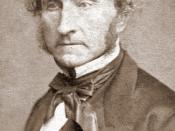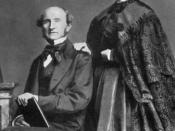As well as being a renowned philosopher, John Stuart Mill worked in politics to advocate his Utilitarian ideas through economics. His utilitarian view being that the greatest good should serve the greatest number of people. At a young age, Mill, who had shown a flare for analytical thinking, joined his fatherÃÂs company: East India Company (EIC). The EIC was developed for the British to be able to pursue their trading needs in the East Indies for products such as; cotton, silk, tea and opium.
Mill spoke regularly in parliament, for views both Utilitarian and in the interest of the East India Company. Controversially, Mill, in the 1827 Parliamentary Review Session, stated the following: ÃÂIt may true that the merchants, who resort thither, are generally the subjects of Great Britain; but the system exempts them from all share in the expenses incurred specifically for their convenience, is a boon, not to them, but to the consumer of the goods, of which they are only the carriers.
Whatever tax might be imposed on them, would ultimately be paid by their customers the savings is purely to the nations of Eastern Asia.ÃÂ1This quote states that Mill is not pleased at all by costs incurred on the EIC for maintaining the ports of Singapore, Malacca and Penang free of import and export charges. This, although not beneficial for Britain, seems to be a contradiction of John Stuart MillÃÂs Utilitarian views ÃÂ as the greatest good (financial benefits for Eastern Asia) for the greatest number of people (the population of East Asia) ÃÂ is exactly what he is not pleased about.
John Stuart MillÃÂs greatest economic work was his book: Principals of political Economy, with his most revised edition being released two years before his death in 1873. This book was so...


